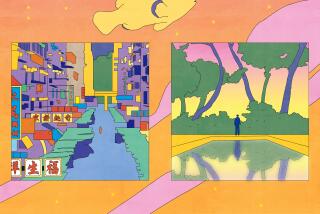Donât hate âOutsourcedâ
Last pilot season NBC made a crazy move. It green-lighted an unlikely new sitcom set in a Mumbai call center. âOutsourcedâ was the hippest thing to happen to South Asians in the United States since Madonna discovered henna. As a writer, I was thrilled to hear about the show, not only because Iâm an American of Indian descent but because I recently lived in Mumbai, helping my husband run a call center. Letâs face it, if my agent couldnât get me an interview on this one, I might as well move back to Mumbai.
As it was, I got a dream job. âOutsourcedâ debuted to solid reviews from the Los Angeles Times, the New York Times, Variety and the Hollywood Reporter. With no big-name stars to draw viewers, it still ranked as high as No. 2 among the networkâs scripted programs last fall. Even after a mid-season move to 10:30 p.m., âOutsourcedâ remains one of the most DVRâd prime time shows.
In my time on the writing staff, Iâve been overwhelmed by the outpouring of support for the show, especially from members of the South Asian community. Positive comments on Twitter after the show airs heavily outnumber critical ones, and according to the New York Times, even an audience of call center workers in India loved the show.
Whatâs odd, then, is the level of vitriol directed at us by some reviewers. Theyâve called it âinsulting and condescending,â filled with âoffensive stereotypesâ and based on âobvious cultural ignoranceâ on the part of the writers. New fans of the show seem to feel the need to post and tweet apologies for liking it: âIâm sorry but I really love âOutsourcedâ â or âI think âOutsourcedâ is hilarious. Donât hate me.â
Based on their bylines, most of the offended parties are not from the Indian community. Perhaps they donât realize that we have five South Asian writers on the show telling stories that often come straight from our personal experiences. Or perhaps they donât believe Indians should make fun of themselves.
An early episode featuring the âIndian head bobbleâ came from my non-Indian husbandâs confusion in communicating with his call center staff. A sequence about Todd, the American boss, and his difficulties boarding an Indian train was inspired by a story another Indian writer shared about his grandmother, who spent a lifetime struggling to push her way onto crowded Indian trains, then employed the same tactics on her first visit to America, elbowing whole families to secure her spot on the monorail at Disneyland.
These stories made us laugh in the writersâ room. Yet when we highlight cultural differences on the show, we risk being called offensive. One online comment vehemently accused us of racism for the following line: Todd: âI didnât know you guys celebrated Valentineâs Day.â But ignorance of a foreign culture isnât racist; itâs just ignorance.
And as for stereotypes: Simple, recognizable characters are the building blocks of all comedies. The templates we build on are universal ones: the shy wallflower, the ruthless boss, the guy with no social skills. We donât use what I consider to be Indian stereotypes: doctors, engineers, spelling bee champs, Kwik-E-Mart owners. (And for the record, Iâm a huge fan of Apu on âThe Simpsons.â)
âOutsourcedâ is not a documentary about call centers. Itâs a comedy, which means we tweak and exaggerate to get a laugh. Yet we also have moments of truth that are deftly realized.
When Todd encourages Madhuri, the call centerâs wallflower with a beautiful voice, to pursue fame and fortune as a singer, she informs him that she already has her dream job. Itâs a moment that rings true to a pragmatic Indian value system. When Todd encourages Rajiv, his Indian assistant manager, to pursue the woman of his dreams in spite of her fatherâs disapproval, it also rings true. Americans arenât as hung up on parental approval, and Toddâs encouragement proves to be a positive catalyst in Rajivâs life.
At the end of the day, the characters in âOutsourcedâ care about each other and learn from one another. Those who only cite offensive stereotypes are missing the spirit of the show (or perhaps theyâve never actually watched it). What I love most about âOutsourcedâ is that the humor ultimately comes from a place of affection.
Itâs pilot season again, which means TV execs are once more making decisions about which shows to green-light and which to cancel. My greatest concern is that âOutsourcedâ is being judged superficially â on the color of its skin, so to speak, instead of the content of its characters.
âOutsourcedâ has the potential to celebrate our cultural quirks, to build bridges between communities and perhaps, most important, to prove that there is a viable alternative to the âone brown face in a white ensembleâ model of âdiversity.â
As the Hollywood Reporter put it, âItâs still hard to believe that the network took a chance on it; the public should do the same.â
Watch the show. Give it a chance. And donât feel guilty if you like what you see.
Geetika Tandon Lizardi has written for film, stage and television.
More to Read
A cure for the common opinion
Get thought-provoking perspectives with our weekly newsletter.
You may occasionally receive promotional content from the Los Angeles Times.










